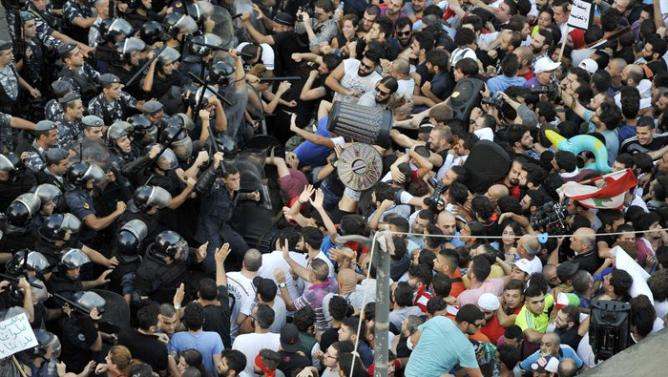By ZEINA KARAM Associated Press

Police firing tear gas and water cannons battled thousands of Lebanese protesters Saturday demonstrating against government corruption and political dysfunction amid a trash crisis, with the sound of gunfire echoing through the streets into the night.
Footage on local television showed at least one wounded protester among downtown Beirut’s Ottoman-era buildings and lavish apartment complexes. An Associated Press journalist saw riot police used batons to beat back protesters while others were carried away, overcome by tear gas. Private television station LBC reported police attacked one of its crew.
"The people want to topple the regime!" protesters cried out, a slogan used during the Arab Spring protests that swept through the region.
Saturday saw the biggest demonstrations by far since garbage began piling up on the streets after the capital’s main landfill was closed a month ago. An online group calling itself "You Stink!" and other civil society groups organized the rallies, calling on Lebanese to join them in a revolt against the corrupt system. They said they plan to stay in downtown Beirut near the government building and parliament.
The government has been unable to find an alternative system for waste management, amid government paralysis and bickering among politicians.
Some residents have resorted to burning trash on the streets, sending toxic fumes over the city’s skyline and into homes. The health minister has warned of a catastrophe as some have started dumping trash in valleys, rivers and near the sea.
The protest began in Riyad Solh Square near the government building. Police fired tear gas and water cannons to beat back protesters after some of them tried to push through a security cordon. The protesters later moved to the nearby Martyrs’ Square and pledged to stay the night.
"We want to live in our country," read one poster carried by a protester. Another read: "Some trash should NOT be recycled," written in red over photos of Lebanese politicians.
Lebanon has a sectarian power-sharing system that ensures equal representation between the country’s main religious sects. That often means complete paralysis.
It was not clear whether the snowballing protest movement would turn into something bigger. Lebanese have rarely taken to the streets unless it was for a political cause backed by a political party. Those behind recent protests have urged more people to join them.
The tiny, fragile country with a strong sectarian divide has managed to survive the Arab Spring uprisings that toppled Arab dictators, the onslaught by the Islamic State group in Syria and Iraq and the fallout from 1.2 million Syrian refugees now straining its economy.
But political disputes have kept the country without a president for more than a year. Parliament has extended its own term twice and has not convened because lawmakers differ on whether they can continue working before voting for a president.



